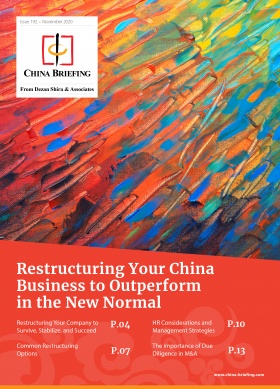Managing Risks Within Joint Ventures in China
By Ivy Gu, Allan Xu, Dezan Shira & Associates’ Shanghai Office
Editor: Dorcas Wong
Joint ventures (JVs) present foreign investors with a unique blend of capital, know-how, and assets which can allow investors to gain a foothold in a new market or prime a business for continued long-term success.
However, at times, joint ventures may raise concerns regarding how to retain legal control and maintain oversight of financial and operational activities.
This can become an issue if either party has less resources or personnel available to them on the ground, is hindered by a language barrier, or is less familiar with the local laws, business regulations, and landscape.
In 2020, these concerns have been compounded by travel restrictions, which have compromised the ability of many foreign investors to directly supervise their joint venture in China.
In this article, we present two actual Dezan Shira & Associates joint venture case studies of fraudulent activity detected at, both, the shareholder and management levels, and discuss some of the ways to mitigate against these risks.
WEBINAR – How to Control Risks in Your China Joint Venture (December 3, 2020)
In this webinar, our experts break down some common challenges that joint ventures in China face and offer potential solutions to mitigate against risks.
However, if you’re seeking personalized advice for your situation please contact Ivy Gu (Manager of Audit Services in Shanghai) ivy.gu@dezshira.com or Allan Xu (Senior Manager of Business Advisory Services in Shanghai) at allan.xu@dezshira.com.
Case I: Suspected profit shifting from joint venture to Chinese shareholder’s own company
A joint venture manufacturer located in Shanghai is owned by a Chinese investor as a minor shareholder (holding 20 percent of total shares), and US foreign investor as the major shareholder (holding 80 percent of total shares).
The main product produced by the joint venture uses the US investor’s brand name, which is very well-known in the industry. Dezan Shira & Associates were engaged by the foreign investor to perform a periodical financial review for the joint venture, with the purpose of providing general supervision of its operations and maintaining accounting standard compliance.
In 2020, the Chinese shareholder acquired a new large well-known corporate client (“new client”) to purchase goods from the JV. During Dezan Shira & Associate’s process of financial review, it was discovered that the gross profit margin of the transactions with this new client were much lower compared with that of the JV’s general profit margin, and that the business invoices and logistic arrangements with this new client seemed very abnormal.
During the financial review process, the following initial details were discovered:
- the goods were delivered to a third-party company’s warehouse, not to the new client’s plant address;
- the purchase invoices from the new client’s purchase of the products were issued from another company (“third party company”) to the JV; and
- the sales amount was being paid by the client to the third-party company, then the third-party company passed this on to the JV.
After a more thorough investigation of the situation, it was later revealed that the ultimate controller of the third-party company was the Chinese shareholder.
Dezan Shira & Associates raised this potential issue with the overseas shareholder. After further investigation, collection of related evidence, and several rounds of negotiation, discussions were arranged between the foreign investor and Chinese shareholder. In the end, both parties agreed to maintain a reasonable profit level in the JV for the transactions with the new client.
This case exemplifies the types of risks that can occur between two shareholders in a JV structure where one party has limited on-the-ground supervision. In such situations, the importance of undergoing periodic financial reviews cannot be understated, even where no risks are initially detected. Internal audits can offer the overseas shareholder a more holistic understanding of the JV’s operations and financials – and is particularly pertinent in situations where one party has limited on-site access.
Case II: Key chops and company certificates abused by local management
A manufacturing company based in Nantong, Jiangsu Province is jointly owned by a European and Chinese shareholder. Within the company, the European shareholder was stuck outside of China since the beginning of 2020, due to COVID-19 travel restrictions. The company’s key chops and certificates were held by local management for ease of conducting daily business operational tasks.
In May 2020, the European shareholder received information from a local whistle blower about some alleged incompliant behavior from the local management. Dezan Shira & Associates were engaged to perform a detailed review, assist the foreign shareholder in understanding the real situation on the ground, and resolve the problem where necessary.
After our review and investigation, it was revealed that local management used the company chop and certificate to make financial investments using the company’s funds. The financial investments were performed without notifying or obtaining the approval of the board or the foreign investor. Furthermore, the investment interest and profit earning went directly into the local management’s personal bank accounts.
In the end, with the assistance of our firm, the foreign investor was able to solve the problem by lawfully getting rid of the local management personnel. Ultimately, the European shareholder’s rights were protected, and the loss was very limited.
This case provides a different perspective on the fraud risks that can arise – this time arising at the management level in a JV. Similar to the previous case, it provides another example as to why it is important to stay abreast of a business’ financials, particularly where legal control has been relinquished to one party through possession of the company chops and certificates.
Take steps to mitigate your JV control risks
The above mentioned case studies are examples of some of the types of challenges that foreign investors may face when operating within a JV corporate structure. However, there are many ways in which investors can hedge against or better manage their risks.
Maintaining some oversight on corporate filing documents, agreements, and contracts, shareholder resolution and board resolution, financial statements, transactions, and day-to-day activities is necessary – particularly where actual on-the-ground access is limited.
In line with this, legal risks may come into play where chops and certificates should be properly managed. This should be countered with the appropriate checks, balances, and accountability measures being put in place to hedge against any risks that may arise. Certain clauses can be arranged in the shareholders’ agreement and/or articles of association to state each party’s rights and obligations and the indemnity in case any violation occurs.
If you discover that either party or the local management personnel is causing damage to the JV’s interest, please do not hesitate to consult our advisors. The applicable laws also grant you the right to protect the interests of you and the JV. Any party or local management personnel who violates the laws and regulations and causes the JV to suffer losses shall bear the compensation liability.
Foreign investors can mitigate some of their risks by working with their local service providers to answer the following questions:
- What do the PRC Laws say about JV structure controls?
- How to manage the operational status of your JV?
- How to protect your IP rights and trade secrets within a JV?
- How to manage a deadlock and exit mechanisms in JVs?
Familiarizing yourself with the local laws and regulations, and ensuring compliance is the first step to managing your risks. Investors should be aware of the Foreign Investment Law, which came into effect on January 1, 2020, which significantly impacts the structure and governance of JVs. Existing JVs will have a five-year transitional period to make sure they are compliant with the PRC Company Law and have adjusted to the new three-tier structure (board of shareholders, the board of directors and manager) now required of JVs.
To understand how you can hedge against risks and maintain control within your JV, please feel free to contact Ivy Gu (Manager of Audit Services in Shanghai) ivy.gu@dezshira.com or Allan Xu (Senior Manager of Business Advisory Services in Shanghai) at allan.xu@dezshira.com for more information.
About Us
China Briefing is written and produced by Dezan Shira & Associates. The practice assists foreign investors into China and has done so since 1992 through offices in Beijing, Tianjin, Dalian, Qingdao, Shanghai, Hangzhou, Ningbo, Suzhou, Guangzhou, Dongguan, Zhongshan, Shenzhen, and Hong Kong. Please contact the firm for assistance in China at china@dezshira.com.
We also maintain offices assisting foreign investors in Vietnam, Indonesia, Singapore, The Philippines, Malaysia, Thailand, United States, and Italy, in addition to our practices in India and Russia and our trade research facilities along the Belt & Road Initiative.
- Previous Article Chinas Einkaufsfestival Double 11 testet die Konsumkraft nach COVID-19
- Next Article Terminating an Employee in China Upon Expiration of Fixed Contract







